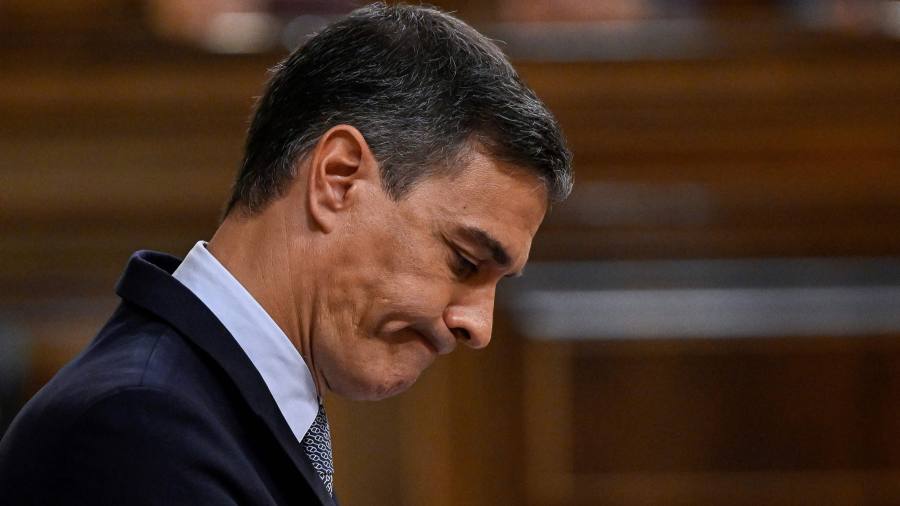Spain’s prime minister Pedro Sánchez has called a snap general election for July after his Socialist party suffered a resounding defeat in local and regional elections on Sunday.
Sánchez made the surprise announcement on Monday morning as the conservative People’s party was celebrating huge electoral gains after a campaign in which it attacked the prime minister’s political pacts and morals.
Sánchez, who has cultivated an image as a statesman on the world stage but become a deeply polarising figure at home, said he would now dissolve parliament to prepare for the polls on July 23.
The decision means Spain will be in the throes of another acrimonious campaign as the country takes on the EU’s six-month rotating presidency at the start of July, an opportunity the Socialists have been keen to take to burnish Sánchez’s status at home and abroad.
As holder of the presidency, Madrid will play a leading role in setting the agenda for the EU at a time when it is facing big challenges from the Ukraine war, strained relations with China and charting climate change policy.
Voters will choose between a Socialist-led leftwing bloc focused on economic justice and a rightwing bloc comprising the PP and the hard-right Vox party prioritising traditional values and institutions.
In a televised address, a stony-faced prime minister said he took responsibility for the devastating election results and cited the EU presidency and the Ukraine war as reasons why it was necessary to “clarify” the will of the people.
“There is only one infallible method to resolve these doubts. That method is democracy,” he said. “The best way is for Spaniards to have their say and to speak without delay to define the country’s political direction.”
Less than three weeks ago Sánchez had just completed his long-awaited first visit to the White House, where US president Joe Biden thanked him for Spain’s support for Ukraine in the war with Russia.
But in Sunday’s vote, held in 12 of Spain’s 17 regions and more than 8,000 municipalities, his Socialist party lost control of swaths of territory to the right, suggesting Sánchez would face an uphill struggle to hold off conservatives in a general election that was due to take place in December.
Alberto Núñez Feijóo, leader of the PP, welcomed the announcement of the snap election. “The sooner [the election], the better,” Feijóo said, calling on voters to give his party a “clear majority”.
Despite the relatively strong performance of Spain’s economy and a series of pro-worker legislative achievements, Sánchez’s standing has been weakened by his controversial political alliances.
He has relied on the parliamentary votes of Catalan separatists and a Basque secessionist party whose electoral candidates included former members of Eta, the disbanded terrorist group, found guilty of violent crimes.
Since 2019 he has been in coalition with the leftwing Podemos party, which hurt him by pushing a botched sexual consent law that resulted in more than 1,000 convicted sex offenders having their prison sentences cut.
Despite the strong electoral performance of the PP, the opposition will need the support of the Vox party — now Spain’s third-biggest political force — to govern in many cities and regions.
The right’s strong showing was aided partly by the collapse of the centre-right Ciudadanos party, which left conservative votes split between only the PP and Vox.
The political left remains more fragmented and analysts saw the snap election as an attempt by Sánchez to create a sense of urgency to draw as many votes as possible to the mainstream Socialists.
Read the full article here




